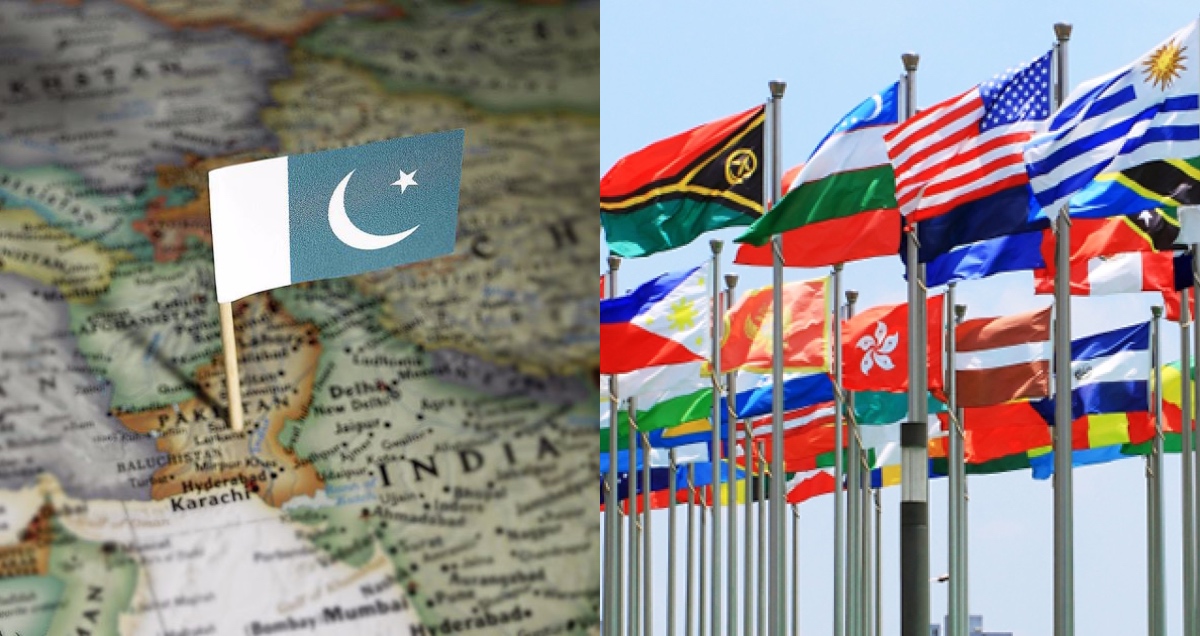Disclaimer*: The articles shared under 'Your Voice' section are sent to us by contributors and we neither confirm nor deny the authenticity of any facts stated below. Parhlo will not be liable for any false, inaccurate, inappropriate or incomplete information presented on the website. Read our disclaimer.
Pakistan, the land of pure, which got emancipated from the British rule on August 14, 1947, is geographically located in South Asia. The country is contiguous to China, Afghanistan, Iran, and India. Pakistan is unable to achieve its foreign policy goals in the current scenario owing to multiple factors and challenges.
[adinserter block= “3”]
Historical analysis
Before 1947, Pakistan was the part of India, ruled by British and many other rulers, such as Muhammad Ghouri, Sher Shah Suri and the mighty Mughal empire. When the Britishers left they partitioned the land of India and Pakistan was incepted on the face of Map.
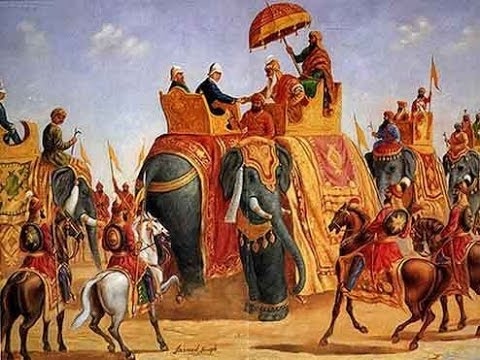
Source: mg tow
The partition was unacceptable to India, particularly Hindus, as they called the partition vivisection of their holy cow. Many in India thought it is not the end and Pakistan would come back to India as it will not survive all alone, meaning the Indian ruling elite never accepted Pakistan in true spirits.
The unacceptance of Pakistan is driven by the ideology of Rashtriya Swayamsevak Sangh (RSS), a Hindu rightist, a nationalist and a paramilitary organization founded by K. B. Hedgewar. In addition, a worker of RSS, Nathuram Vinayak Godse, killed Mahatma Gandhi, for favoring Muslims demands during the partition.
Currently, the ruling party of India, BJP is motivated and backed by the RSS. Hence, it is evident India never accepted Pakistan and its main policy is to financially and politically demolish Pakistan, so India could fetch it back. Thus, Pakistan’s foreign policy has been struggling since independence mainly due to the Indian factor.
The neighbor on Pakistan’s west, Afghanistan, is also one of the many enemies of Pakistan. Afghanistan opposed Pakistan’s entry in the United nation in September 1947 and did not grant De Jure recognition to the country, mainly owing to the conflict of the Durand line.
Durand Line is a borderline marked in 1883 by Sir Mortimer Durand, bordering Afghanistan and Pakistan (India at that time). Therefore, when Pakistan got independence, pursued by India, Afghanistan claimed back its border, saying the agreement stands null and void now, as Britishers left.
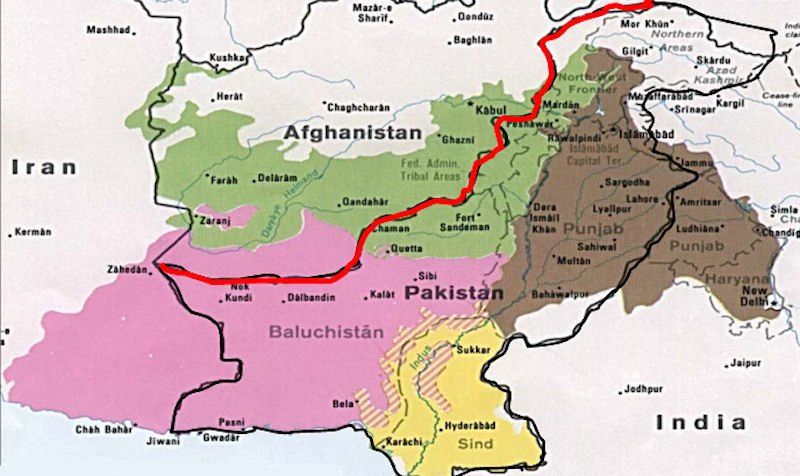
Source: Chitral today
Iran, unlike Afghanistan, was the first country to recognize Pakistan in the united nations. The relations between the two stood cordial until the Iranian revolution of 1979. After the revolution, Iran adopted anti-west sentiments and the conflict of Shiites and Sunni arose, parting ways amid Pakistan and Iran.
Fortunately, China is Pakistan’s only neighbour, who is standing by Pakistan since its early years. The two countries share amicable relations and China has come to resue Pakistan on many international fronts.
The US, relations of Pakistan with the US always remained murky at some points the two nations became significantly closer and at other points, they were at daggers drawn. The swift changes in US policy caused multifarious havocs on Pakistan.
Core principles of Pakistan’s FP
- To protect the sovereignty
- To resolve the Kashmir issue
- To establish peace in Afghanistan
- To establish cordial relations with its neighbors
- Safeguarding National Security and territorial integrity
- Robust economic relations with the economic giants
- social and economic development
- securing peace in the region
Challenges that stumble Pakistan to Achieve its Foreign Policy Goals
The Indian Factor
As discussed above India did not accept Pakistan since 1947 in true manners, India never misses a chance to stumble the execution of Pakistani foreign policy goals.
Kashmir, the bone of contention between the two neighbors, is the prime cause of animosity between the two. Hence, India does anything possible to retain Kashmir and avoids any kind of negotiations, mediation, arbitration. Most importantly, India withholds the right of plebiscite in Kashmir, going against the UN.
The animosity caused by Kashmir has led India to destroy Pakistan on every front. When the power vacuum was left in Afghanistan after the war on terror, India established dozens of embassies and consulates in Afghanistan to asymmetrically defeat Pakistan.
The Indian spy, Kulbushan Jhadev, apprehended in Pakistan admitted that the insurgency in Balochistan and bombings and target killings in Karachi are driven by RAW. Thus, creating terror in Pakistan to economically, socially and politically suppress the country. This has cost too much to Pakistan as it developed the bad image of Pakistan across the globe and hindered Foreign Direct Investment (FDI).
The recent revocation of article 370 and 35 A in India, making Kashmir an integral part of her, causing the utmost damage to Pakistan’s foreign policy regarding Kashmir.
Currently, India with its hoax narrative, trying to isolate Pakistan in the world and endeavoring to put Pakistan in FATF blacklist. India has left no international platform, where they unjustly accused Pakistan of exporting terrorism in the region.
As a whole India has caused immense damage to Pakistan and halted its way to obtain its foreign policy goals to a great extent.
[adinserter block= “10”]
The Afghanistan and US factor
When Pakistan chose to side with the US on the global war on terror, it has inflicted great injuries to the country. In the ’70s Pakistan trained, Jihadi groups with the enormous support of the US by indoctrinating them along with the CIA to counter USSR in Afghanistan. The US won the cold war due to the paramount efforts of Pakistan.
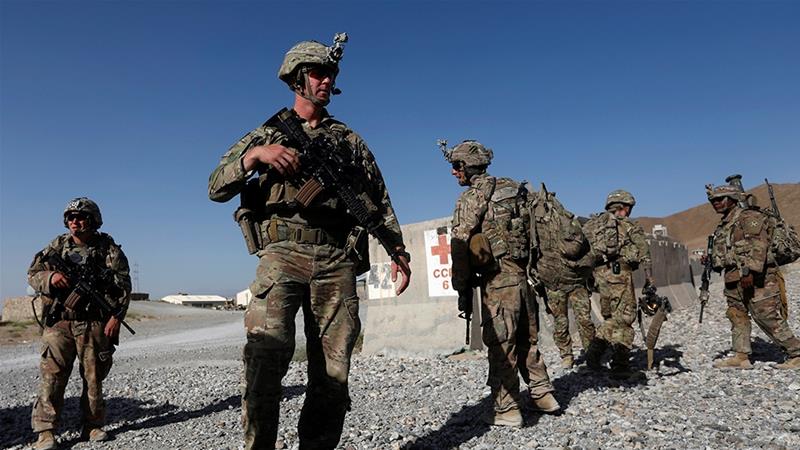
Source: Aljazeera
I n the ‘2000s Pakistan, with the US launched operation on those outfits, which were once supported by the country, opened the door of terror towards Pakistan, many jIhadi groups stood against Pakistan and it costs her 70000 lives and billions of dollars. In the ’70s the US-supported war in Afghanistan left Pakistan with the heroine and gun culture along with the radical organization. Besides, the bulk of refugees the war created are yet to repatriate to Afghanistan and causing much harm to the Pakistani economy.
Interestingly, Pakistan lost both the US and Taliban as the US accused Pakistan of not doing much and the Taliban accused her of indiscriminate killings.
The war deteriorated the global image of Pakistan and soared the anti-Pakistan narrative, sold by India; it gave rise to the fanatical organization in Pakistan TTP is one of those. In his UN speech, Prime Minister Khan said that he was against joining the ‘War on Terror’, but the question arises did Pakistan really had a choice?
In ’70s Pakistan was the member of SEATO and CENTO, it has no choice then and in 2001, Pakistan also had no choice except going with the superpower.
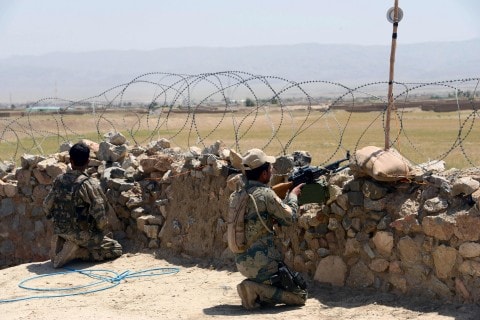
Source: Washington Post
The war on terror wreaked havoc in Afghanistan and Pakistan is the most affected country owing to the war. Currently, the situation of Afghanistan is quite dismal, border skirmishes between Afganistan and Pakistan are rampant. The unstable Pakistani soil is greatly impeding Pakistan to achieve its FP goals of economic and social stability coupled with peace in the region.
IRAN, US and Saudi
Once again Pakistan was faced with a dilemma whether to side with Iran, her neighbor with whom many economic benefits are attached or to side with the mighty power the US. Pakistan sadly had no choice but to chose the US.

Source: DW
Pakistan can greatly benefit from the Iranian goods, by trade and most importantly by the Iran gas pipeline, which can eradicate the energy crises in Pakistan. However, Pakistan can’t do this because of the Arab world, mainly Saudia Arabia and the West, particularly the US.
President Trump seems quite irked by the Iranians and so does the Saudis. The war between Iran and the US is greatly affecting Pakistan. Pakistan can’t trade owing to US sanctions. The funding from Saudia Arabia cannot be denied as she helped Pakistan in various difficult junctures.
The war of Shiites and Wahabis are not only affecting the Arab world but Pakistan. This is one of the key factors the halt Pakistan’s Foreign policy developments.
The Way Forward
In the nutshell, Anatol Lieven in his book, “Pakistan a hard country”, argues that Pakistan is the only country in the world, which has got immense financial aid owing to her geographical location. However, in reality, Pakistan is the only country across the world, which is terribly affected due to its geographical position.
[adinserter block= “4”]
In this grave scenario, Pakistan is going through immense economic crises due to the Afghan war. It has a blackened image due to Indian propaganda. The social lives of Pakistanis are gloomy owing to Indian espionage and asymmetrical warfare.
Iran and the Saudi war is directly affecting Pakistan. Pakistan cannot deny the fact that Saudi has helped her and Iran is its neighbor. In short, Pakistan is stuck amidst the global wars and global powers and all this is hindering Pakistan’s prosperity and obtainment of her FP goals.

Source: Twitter
However, the new developments, such as Pakistan joining SCO and siding with China and Russia is the blow to the west. As China and Russia want peace in Afghanistan so does Pakistan; both the powers want CPEC to complete, so does Pakistan, both have good relations with Iran and want her to rise, so does Pakistan. Hence, the only Option Pakistan has is to tilt the shift and robustly hold the hands of Russia and China. As the west and the Arab world have not yielded any good to Pakistan.
Recently, almost all the Arab world sided with India on Kashmir issue and not with Pakistan. Trump halting the Peace talks with Afghanistan and Russia and China pursuing talks is another omen for Pakistan to change the sides and extirpate challenges to her foreign policy.

